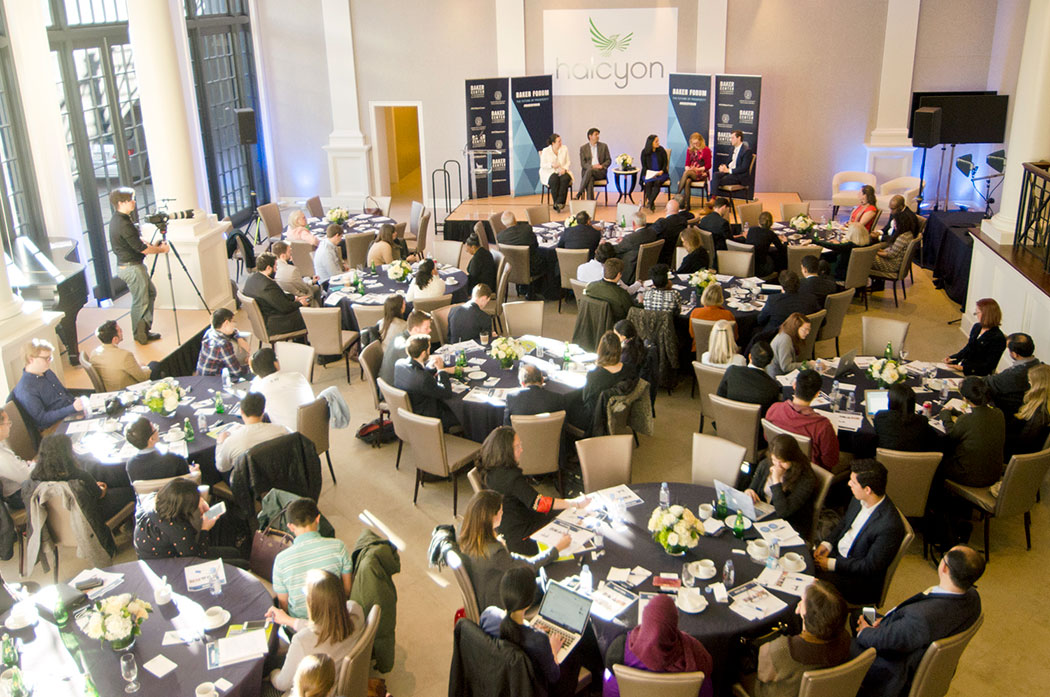
Leaders from business, government, academia, and the nonprofit world gathered at the inaugural Baker Forum, The Future of Prosperity, to discuss the pace of technological change and what it means for our economy and the future of prosperity.
Sonal Shah, Executive Director of Georgetown’s Beeck Center for Social Innovation + Change, said the rapid pace of technological change was affecting every part of our society.
“Technology is making us all more connected. Technology is helping us understand more, see more – everything from virtual reality to automation to digital technologies. And we’re moving at such a rapid pace – that we can’t even keep up with how fast the pace is,” Shah said. “At this pace of change – what do the institutions look like, where are the jobs coming from…how do we train the next generation of leaders?”
The Baker Forum is the signature annual event of the Baker Center for Leadership & Governance, a major center at Georgetown within the Institute of Politics and Public Service at the McCourt School of Public Policy. Through the S&R Foundation, the event took place at Halcyon House, in partnership with the Halcyon Incubator, which helps social entrepreneurs transform audacious ideas into scalable and sustainable ventures.
Dealing with Disruption
The first panel, moderated by Shah, explored issues surrounding Disruption & Innovation in a Changing Economy.
Donna Harris, a Co-Founder tech incubator 1776, Aneesh Chopra, who was the nation’s first U.S. Chief Technology Officer, Karin Klein, a Founding Partner of Bloomberg Beta and McCourt School student and Baker Innovator Christian Conroy (MPP/MSFS‘19) discussed the role of institutions in our new uncertain world, how we better prepare young people for jobs including those that may not yet exist, and how to combat the jobs displaced by technological innovation.
Chopra, the President of NavHealth, said we have missed an opportunity to harness technology as a public good to help people make the best decisions throughout their lives.
“These very same technologies that we’re seeing affect our personal lives have had little to no impact on the labor market itself,” Chopra said. “What have we done in our labor market to harness all of these capabilities so that each of us can make the best decisions about every stage of our life – at every stage of our lives.”
Recapturing the American Dream

In a fireside chat with McCourt School Dean Edward Montgomery, former Commerce Secretary and co-chair of Albright Stonebridge Group Carlos Gutierrez recalled his personal journey from young immigrant to c-suite and cabinet-level positions.
“I’m a firm believer that the American dream is alive and well,” Gutierrez said. “We are a society that is always in change, that’s always moving, that’s always creating new opportunities. Is it competitive? Yes. Is it tough? Yes. Do you sometimes have to outwork people? Yes. But I think it’s alive and well.”
In a forward-looking conversation, Gutierrez and Montgomery tackled many of today’s most pressing policy issues and what they mean for tomorrow’s economy, like the U.S.’s abandonment of the Trans-Pacific Partnership, comprehensive immigration reform, and the role of business and government in society.
Convene, Challenge and Cultivate
The Baker Center for Leadership & Governance brings together stakeholders from government, business, nonprofits, academia, and faith-based institutions to tackle a global policy challenge and begin the important work of restoring faith in our institutions.
Mo Elleithee, Executive Director of the Georgetown Institute of Politics and Public Service, described the mission of the Baker Center for Leadership & Governance as threefold: 1) to convene our core institutions to engage in robust dialogue about the most complex issues of our time, 2) to challenge the status quo and spur bold, creative ideas—unlocking our collective civic imagination, so there are no boundaries to the solutions we propose; and 3) to cultivate the next generation of thinkers and doers who will implement change.
“The core premise behind the work of the Baker Center is that people have stopped trusting our institutions. We hear about it a lot in the context of politics these days…but it’s deeper than that,” Elleithee said. “Across institutions, we are facing a significant erosion of trust and so the Baker Center…we exist to try to bring together the representatives from these institutions with the next generation of leaders to figure out how we can reestablish that trust.”

The Future of Prosperity served at the inaugural Baker Forum, an annual global gathering of leaders from government, business, nonprofits, academia, and faith-based institutions, to leverage their combined experiences and resources to evaluate and respond to a policy challenge, identifying and executing on solutions to improve society for all.
Jon M. Baker, Sr., (C ‘64), Founder, Chairman, and CEO of International Planning Group, urged students and the audience to step up and be engaged.
“Georgetown is a great place – Washington is a great place to be able to have discussion and dialogue, to sit down and disagree, and to finally come up with solutions,” Baker said.